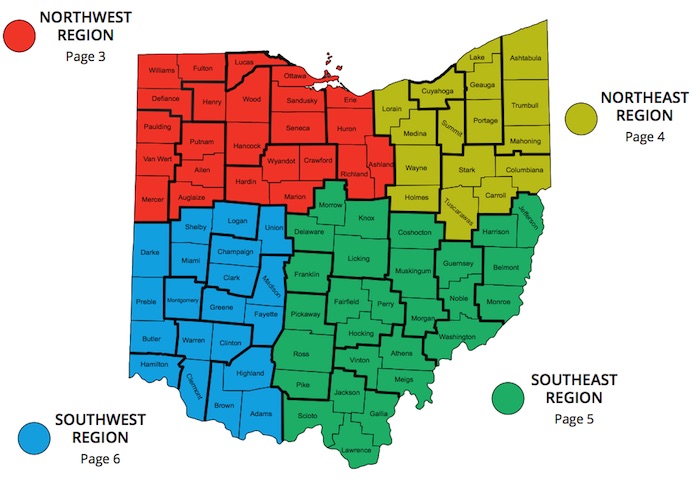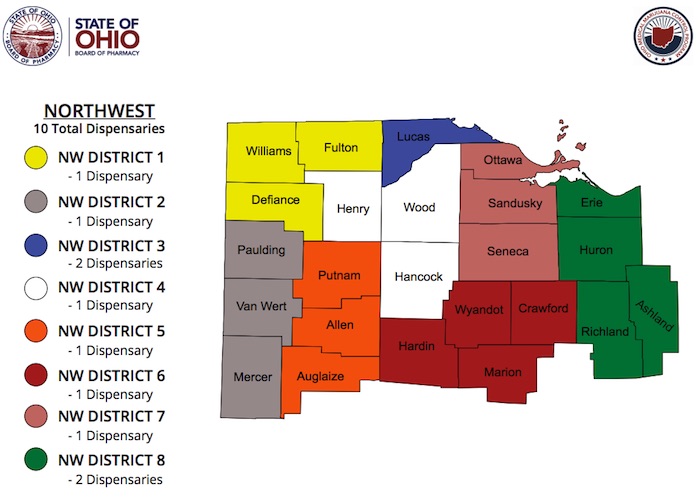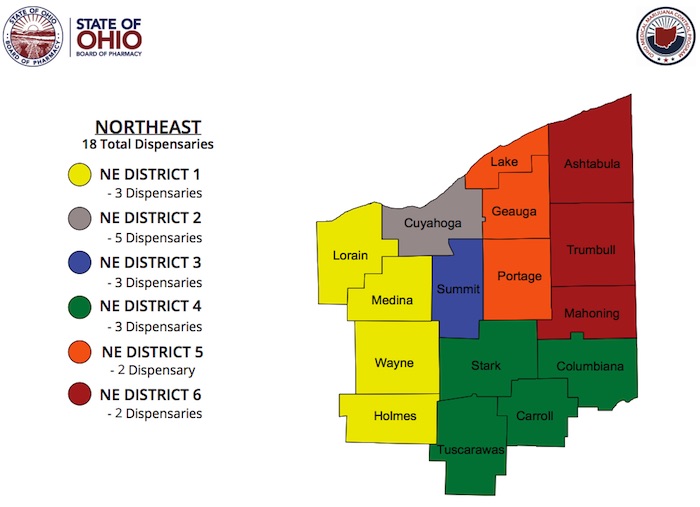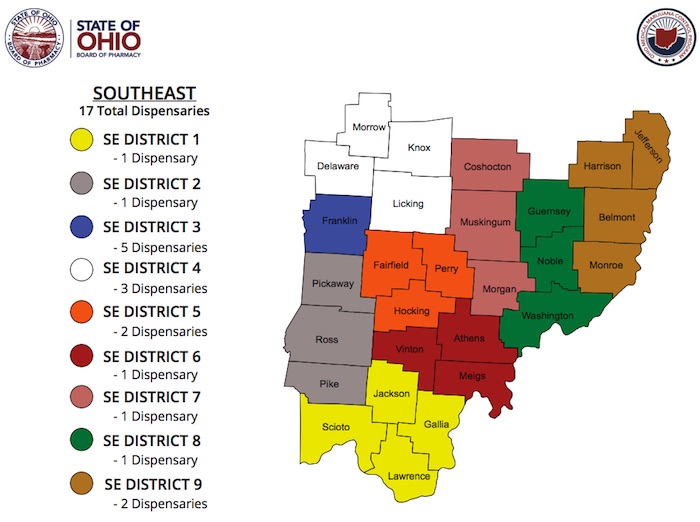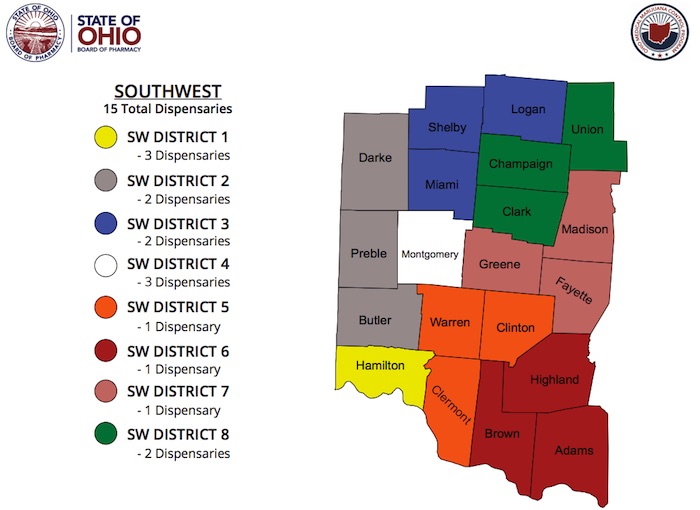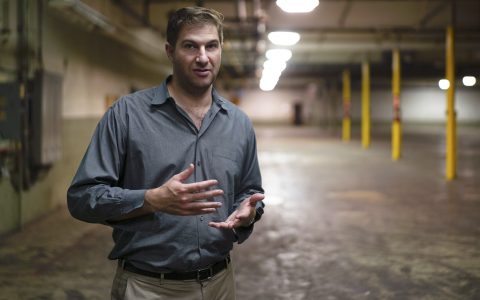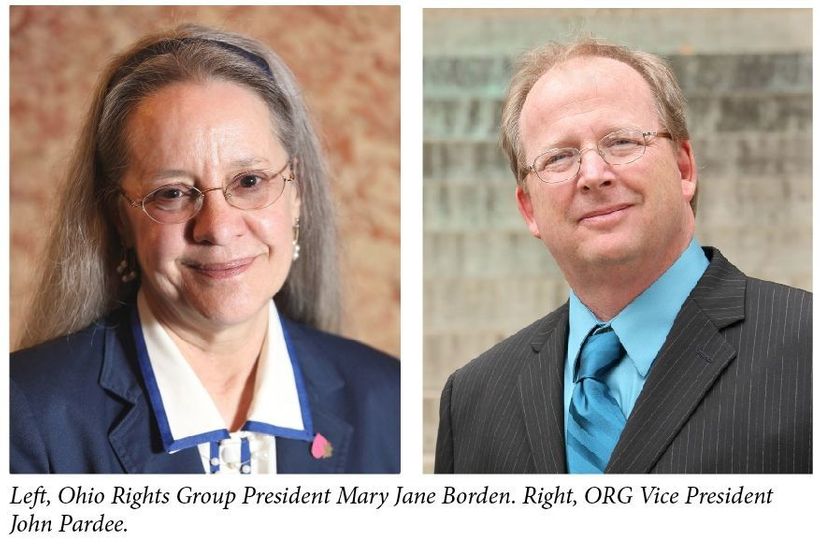The Grassroots Goes Down: Inside Ohio’s Corrupt Medical Marijuana Rollout
Author’s note: After writing a four-part series about the cartel-like cannabis takeover happening in
Florida, I had many people reach out to me suggesting I look into what was happening in Ohio. I received a small research grant from the Ohio-based Cannabis Museum (owned by Don E. Wirtshafter) to visit the state, conduct interviews and take the needed research time to get it right. The Cannabis Museum grant was accepted on the condition that Wirtshafter would have no influence over the content in any way, especially because he is a key player in this narrative. At first, I thought I could write this and move on in a couple weeks, but what is happening in Ohio is so important, historic and complicated that it merited a much deeper dive. What you are about to read summarizes a complex web of infighting and greed that turned lifelong friends and advocates into bitter enemies and laid the groundwork for a corporate takeover of this industry before a seed ever legally goes into the ground. What has happened in Ohio is happening everywhere in the United States right now. This same pervasive strain of greed has contributed to an economy leaving many Americans behind and fueling other deeper tensions, and now all but the wealthiest are about to be shut out of one of the nation’s largest growth industries. These articles are just scratching the surface; there are plenty more wormholes yet untraveled, and I hope other journalists who are willing to sort through all the muck will be supported to continue the research and documentation needed as this multi-billion industry moves above board.
***
No matter how divided the United States is, Americans of nearly all demographics support
marijuana law reform. One reason legalization continues to spread, state-by-state, is the promise of economic opportunity. But, as cannabis moves from the fringe to the forefront of the American economy, wealthy investors have rushed to shape the market and they are quickly eliminating opportunities on Main Street in favor of concentrating more wealth on Wall Street.
“Ohio is a battleground state. It’s used to the politics of politics, the backbiting and animus,” says Ian James, the founder of the 2015 ResponsibleOhio campaign.
Had James succeeded, ResponsibleOhio would have made Ohio the first state in the nation to skip medical marijuana and go straight for full legalization, but met massive resistance from marijuana supporters because only a handful of wealthy investors could grow all the pot. After it failed, the Republican-led state legislature pushed a medical marijuana bill through both chambers faster than any other state, under duress. The most successful marijuana law reform group in the nation, Marijuana Policy Project, was threatening to put an initiative on the 2016 presidential ballot in the crucial swing state. Ultimately, Ohio legalized medical marijuana in 2016 and today is rolling out a law heavily influenced by the wealthiest opponents to nationwide drug law reform. Ohio is getting the cultivation “monopoly” it voted down anyway, and although only 24 wealthy investment groups will now be growing Ohio’s medical marijuana, the excitement has already drawn hundreds of applicants and millions of dollars in investment.
While the biggest impediment to the industry is federal law, the dizzying landscape of state-by-state regulation has created boundless opportunities to concentrate wealth, while activists and patients who risked their health and freedom to change minds and policy are left in the dust.
Of the states with some form of legal cannabis commerce, no state better reflects the power struggles of the national industry as a whole than Ohio. Since the early 1800s American reporters have used the phrase, “As goes Ohio, so goes the nation” to describe the political impact of the state, which has demographics that almost perfectly mirror the nation at large. Despite Ohio being one of the first states to decriminalize possession of marijuana in 1975, and despite consensus support that has grown among citizens for all uses of cannabis, Ohio is one of the most complicated places to make legislative change. That’s because of all the well-funded special interests at play in this important swing state, and they are all scrambling for their share of the legal pot.
At the center of it all is a growing body count as the national opiate epidemic has hit Ohio harder than any other state.
Governor John Kasich, who has been campaigning to become president of the United States for the last three years, has employed an
expensive law enforcement-heavy response that has not only failed to combat the problem, but is likely making it worse and killing more people. Now, President Trump is taking the Ohio strategy national and the international corporations that have profited off the epidemic and share in the federal money the state receives to combat it have been given the most say in drafting the state’s corrupt and restrictive marijuana policy. In the meantime, not a single patient has yet to receive legal access to cannabis despite it being non-lethal and growing all around them.
Ohio’s Tangled Grassroots
Some of the biggest money and most influential cannabis activism in the nation has come out of Ohio, but despite Ohio’s proximity to the money and influence in marijuana reform, its activist community has long been mired by infighting and lawsuits, making national organizations wary of working in the state and the path to the ballot elusive.
Ohio native and billionaire heir and CEO of Progressive Insurance, Peter Lewis, was one of the
largest single financiers of cannabis legalization until his death of natural causes in 2013. Through a series of grants starting in 1998, Lewis was the primary funder of the Marijuana Policy Project (MPP), the most effective cannabis policy reform organization in the world. In the 1990s, Lewis was turned on to the cannabis reform movement by his nephew, Don E. Wirtshafter. Wirtshafter is an Athens, Ohio-based attorney and has been a drug war reform activist for over 40 years. He was an early pioneer in the hemp industry and marijuana law reform movement; he founded the Ohio Hempery and over the last 40 years has been involved in either the creation or oversight of many of the country’s leading cannabis and drug war reform groups, including the Media Awareness Project (MAP Inc, aka Drug Sense), the National Organization for the Reform of Marijuana Laws (NORML), The Hemp Industries Association, and, in his home state of Ohio, the Ohio Rights Group.
In the 1990s, Wirtshafter helped Drug Sense secure funding from Lewis and volunteered his services as an attorney for the organization. Drug Sense is a non-profit that got its start in the early days of the internet making digital communication tools like websites and e-mail lists for drug policy reform groups.
Both Drug Sense and MPP were essential parts of the formation of Ohio’s activist community and its divisive history.
In 2007, Wirtshafter and other activists formed the Ohio Patients Network (OPN) with the goal of influencing a medical marijuana bill in the state legislature. OPN was organized through Drug Sense and funded by a series of grants from Lewis via MPP, which allowed it to hire a lobbyist and part-time director. The member-based organization grew to 150 people, but to comply with campaign fundraising law, was forced to split into two organizations: OPN, a 501(c)3 educational non-profit and the Ohio Patients Action Network (OPAN), a 501(c)4 political action committee.
Shortly after splitting in two, factions in OPN and OPAN began to turn on one another. “Troll” attacks in communication forums and social media led to a battle for control of the group’s’ assets. Both groups ultimately lost the funding from Lewis and the ability to influence state legislation.
“We can continue to fight amongst ourselves and destroy each other and Ohio reform in the process,” Drug Sense board member and former OPN member Mary Jane Borden wrote in a 2008 email about the fallout from the infighting. “We will lose funding for any future bill, even if it is a perfect one, and we will be overlooked… We can continue to embarrass, harass, threaten, coerce, defame, and even place one another under even greater risk of scrutiny, arrest, or prosecution. We can engage in escalating campaigns of Mutual Assured Destruction towards what end?”
Little did Borden know, the drama in Ohio’s activist community was just getting started.
The OPAN faction, led by Miami Valley NORML (Cincinnati) founder Rob Ryan, ultimately took over the larger group. The now-estranged OPN faction, led by Wirtshafter, Borden and others morphed through iterations but ultimately became the Ohio Rights Group (ORG). ORG would bring meaningful cannabis policy closer to the ballot than any other grassroots group in the state’s storied history.
The only consistent officer in the history of the ORG is its current president, Mary Jane Borden. Borden says she first became interested in cannabis activism in 1971 when she read Charles A. Reich’s influential book
The Greening of America. She says the book guided her towards anti-corporate, pro-cannabis and environmental activism. From 1982 until 1991, she worked as an analyst for Adria Laboratories, then the largest producer of anti-cancer drugs in the United States. There, she says she provided ongoing analysis of the global drug market. Adria collapsed in 1992 and Borden spent the next few years focusing on her family.
In 2000, Borden reached out to Mark Greer, the executive director of Drug Sense, and officially started working for the organization alongside Wirtshafter. They established a close friendship and support system that endured for years. Today, both are still board members of Drug Sense, but both make it clear they no longer speak with one another.
In January 2010, what would become The ORG was founded as
Medical Cannabis of Ohio, or “MedCann”, in the home of Columbus attorney Bob Fitrakis by Fitrakis, Wirtshafter, Borden and others. MedCann gained new leadership in early 2011 and was rebranded the Ohio Medical Cannabis Association (OMCA). Their first attempt at a ballot
initiative was rejected by the state attorney general in September 2011 due to
problems with the language, so they developed a
new approach.
Instead of trying to write a medical cannabis program directly into the state constitution, they decided to base their language on enshrining the rights of citizens to use, possess and grow cannabis into the constitution while giving the state power to regulate and tax the commercial industry as it sees fit. The Ohio Cannabis Rights Amendment (OCRA) was born.
The rights-based language was unique in the national cannabis legislation landscape and earned praise from Richard Lee, the author and financier of California’s Proposition 19 and owner and founder of Oaksterdam University, the industry’s first trade school. Prop 19 would have made California the first state to legalize marijuana in 2010, but failed by a slim margin. For Ohio activists, Lee’s endorsement was a pivotal push of legitimacy on the OCRA’s path to the ballot.
“Imagine Election Day 2012. All eyes are trained on Ohio— a perennial swing state during a high profile presidential race,” Lee wrote in a message to the group. “Five million voters affirm the
right to use cannabis as medicine. This may represent one of the strongest statements that cannabis reform has ever had the opportunity to make. I ask all Ohioans and reformers to stand with me, stand together and stand up for the right to use cannabis as medicine. Support the Ohio Medical Cannabis Amendment and help get it on the ballot in the fall.”
Lee’s vision never came to fruition, the group failed to qualify for the 2012 ballot and underwent a change of leadership, although the rights-based language remained approved for circulation. Shortly after, because of the use of the word “cannabis” in the PAC’s title, Chase Bank shut down their account.
Mary Jane Borden and John Pardee of the Ohio Rights Group
In January 2013 they reformed as the Ohio Rights Group (ORG) and began collecting signatures for the OCRA with a goal of placing it on the 2014 ballot. With an all-volunteer force, the ORG says they collected nearly 150,000 of the necessary 305,000 signatures needed to qualify for the ballot, though the validity of the signatures collected was never formally verified.
In Ohio, if an approved ballot initiative petition does not make an upcoming election, petitioners can roll signatures over to the next election, and the next, until they successfully collect enough to make the ballot. The ORG was making progress, and if not for 2014, they were confident they could collect what they needed to get the rights-based language on the ballot in the pivotal 2016 presidential election.
“It would have been a tight call [for 2014], but if we had a million dollars we could have done it,” said Borden. “We didn’t know those guys [ResponsibleOhio] were forming in the background.”
As the ORG was picking up steam, it picked up new leadership as well to execute the initiative and vision; John Pardee, David Bruno and Lissa Satori. The ORG came out swinging in 2013, garnering national media coverage for their fundraising efforts, which they hoped would help them to secure the money needed to hire professional signature gatherers and make the ballot.
Cheryl Shuman’s “Coming Home” Tour
A year prior to ORG, John Pardee reached out to what was then the Ohio Medical Cannabis Association to introduce himself and volunteer his help to the OCRA signature gathering efforts. Pardee, an environmental consultant, had a lot to offer the group. He said he had worked on John Kerry’s presidential campaign in 2004 and as an Ohio county coordinator for former President Barack Obama’s 2008 race. Pardee and his wife Linda became cannabis activists because of their son, Jason, who they described as a “master grower in exile in California.” Jason survived a serious car accident and now suffers with chronic pain.
“[My son] was prescribed opiates, he is a lifetime pain management patient because of his injuries. He started having a lot of severe reactions to opiates and using cannabis medicinally. Prior to that he was using it for fun, but he started taking it more seriously as medicine [after the accident]. It bothered me as a father that my son was using cannabis daily. I thought he had a habit or a problem. We had a lot of debates and I looked into the science behind it and was enlightened to the truth,” Pardee said.
Jason moved to Southern California to grow and use cannabis and stay off painkillers. Pardee said he wanted to fight to get it legalized so his son could come home. More importantly, Pardee said his son had developed a “passion for helping sick people” and it was his goal to grow for the Ohio medical market.
When Pardee stepped up to lead the ORG in early 2013, Wirtshafter relocated to Washington State to start a business under the state’s new legalization law. He became “somewhat estranged” from the group, although still included in board communications.
The OCRA was approved for circulation in May 2013 and Pardee began to manage all of the operations of the ORG, with a focus on generating media coverage that could lead to needed financing. Over the summer, he had seen Cheryl Shuman, a well-known pro-cannabis PR and media spokesperson, on ABC’s “The View” promoting the
story of an activist mother from Idaho named Lindsey Rinehart. After watching Shuman on TV, Pardee learned she was from Ohio and reached out for help.
Shuman, who refers to herself in the media as the “Martha Stewart of Marijuana” agreed to headline a 10-day multi-city tour in October 2013. Shuman says she was willing to do what it took to support the ORG because she wants to be able to travel to see her aging father without fear.
“These are the people who need it [cannabis] the most,” Shuman says of her hometown of Portsmouth.
Portsmouth, which sits on the north side of the Ohio River across from Kentucky, is one of the most economically devastated regions in the nation and a center of the opiate epidemic. In her early twenties, Shuman left the Appalachians and moved to Los Angeles where she made connections in film and television and married former Fox News and “Extra” anchor
Phil Shuman. They are divorced, and Shuman has turned her focus on the growing cannabis industry, founding the Beverly Hills Cannabis Club and working with groups like the NORML Women’s Alliance.
When approached by the ORG, Shuman says she jumped at the opportunity, but during the tour she became unconvinced of the ORG’s ability to make the ballot and frustrated that they appeared to support or participate in social media attacks against her. Shuman became increasingly uncomfortable as she says she witnessed cash donations being stored in ORG members’ pockets rather than in a cash drawer with proper accounting.
Shuman says she agreed to do the 10-day tour for free as long as she “had a place to sleep”. In addition, Shuman brought in a corporate sponsor, HempMedsPx, and donated “thousands of dollars” of Beverly Hills Cannabis Club merchandise to sell for ORG fundraising. HempMedsPx donated $2,500 to the ORG in cash and $25,000 more in products to sponsor the tour.
In the middle of the tour, Shuman agreed to appear on the Dr. Phil show and briefly returned to Los Angeles. While she was in California, social media attacks against her were ramping up by longtime cannabis industry blogger Mickey Martin. Shuman and Martin had a long history of disagreement behind them, which culminated in a battle for control of the large online advocacy network Moms for Marijuana. Throughout the tour, it was clear to Shuman that Martin was in communication with people on the ground in Ohio.
When the tour ended, Martin’s attacks increased in the following months and well into the spring of 2014. Pardee leveraged the situation to push Shuman for money in a January 6 email in which he said the ORG would have to drop its “celebrity director of development” because of the online controversies against her unless she brought in at least $10,000 in donations. He said another sponsor had already pledged $10,000 to a $100,000 planned fund that would go towards hiring out-of-work veterans to gather signatures.
“If you can secure any donor to make a similar pledge, that would give us the ability to stand with you during this controversial time. Without any meaningful donors being brought to the ORG through your affiliation, we have no legs to stand on as these donors are aware of the issues floating around about [you]. We would love nothing more than to announce [our] director of development secured us funding well north of $10,000, but that is a good starting point on which we can fight back against the haters. Nobody could fault us for standing with you if you come through in a meaningful way. ...Without a substantial benefactor stepping forward due to your efforts, we have no cover and the ORG will get drawn further into this quagmire, causing more donors to stay on the sidelines.”
Shuman says at that point she started distancing herself from Pardee but did not yet officially resign her position, nor did Pardee request her to step down. Instead, he sent her promotional photos and a biography of himself and suggested she help book interviews for him with her national media contacts.
In January she began collecting documentation for a restraining order against Martin and was surprised to find John and Linda Pardee’s son, Jason, “liking” Martin’s
attacks on her. Martin and Jason Pardee are still “friends” on Facebook to present day, although Martin
passed away suddenly earlier this year.
According to emails obtained from Shuman, on January 19 she confronted the Pardees about their son’s support of Martin. Pardee replied that he and Linda were using Jason as their “Mickey Martin monitor”, and that he was helping her by stopping an attack from Martin preemptively through Facebook Messenger.
“[Jason] is the one who told me how much Mickey was going after you and how big a following he had. He also told me Mickey started attacking the ORG for our support of you…. My son has told me that Mickey is basically a ‘shock jock’ blogger who feeds on controversy and vulgarity. He’s a hack of a ‘journalist’ who runs with innuendo and never verifies his sources. He is all about inviting hate upon himself. The more hate he generates, the happier he is. Not a guy that would be wise to engage and should be devoutly ignored. Jason is not a Mickey supporter, far from it. He’s an ORG supporter whose [sic] keeping an eye on any and all online chatter that is either good or bad for us. My son wants nothing more than to come to Ohio and ply his trade.”
Martin’s attacks came during the division of the national group Moms for Marijuana, in which Shuman had assumed a leadership role shortly before the fallout. Martin and others who had left or stopped supporting Moms for Marijuana formed a new organization: Parents4Pot.
In December, Pardee had reached out to Parents4Pot co-founder Brandon Krenzler via Facebook Messenger for a direct introduction to Martin. He maintained communications with Krenzler through February 2014, while also maintaining friendly contact with Shuman and pushing for more donations.
Krenzler says he and Martin sent information to Pardee and that he told them on multiple occasions he was dropping her but continued to delay it, so Krenzler and Martin delivered an ultimatum.
“It was us or her, there’s no both. Both of us knew the things he knew and what he was saying,” Krenzler said. “You know how somebody will reveal themselves if you just listen to what they say about themselves? He was saying he had his hands tied because she was from the area and it would jeopardize his success if he stepped away from working with her.”
Krenzler and Martin delivered the ultimatum to Pardee and then Shuman returned to Ohio to confront him in person. He invited her over for dinner to talk and when she felt it had become clear Pardee was participating in the attacks against her, she accused him and other volunteers of pocketing cash on the tour and asked that he turn over an accounting of the cash flow. Shuman says Pardee didn’t deny pocketing money on tour stops, saying that he and his wife had spent their entire life’s savings and had “sold practically everything they owned to run this.”
By early February, Shuman says she told Pardee to take her name off ORG marketing materials, that she wanted nothing to do with him or the group, and for a time the relationship was cut off. Shuman accused ORG members on Facebook of pocketing donations, they maintained in February email threads to the board that they did not and it was not Shuman who dumped them, but it was they who dumped her. Nonetheless, in the late spring of 2014, Pardee reached back out to her one last time looking for help bringing in donors.
“He wanted me to basically buy a board seat on the thing [ORG]. He told me, ‘Cheryl, if you can raise the money we will cut you in and put you in on a board seat. But right now, unless we get a huge infusion of cash, we aren’t going to get this done,” Shuman said. “Pardee was desperate for money, I mean desperate, and desperate people do desperate things.”
Shuman says she declined the offer. In desperation, Pardee cut her in on another secret. Shuman says he told her he was working on a “merge with another group in development,” ResponsibleOhio, led by Ian James of the Strategy Network. Pardee said he had given her contact information to the group and they would be reaching out to her.
Shortly after Pardee’s last communication with her, Shuman says she received a call from Ian James seeking her opinion about the ORG.
“When Ian called me he said they wanted to sell him the signatures and also wanted a board seat on ResponsibleOhio,” Shuman said. “I told Ian what happened, and I think he made a deal with [Pardee] anyway.”
As the 2014 election neared the ORG was still without the cash infusion they desperately needed to make the ballot and ResponsibleOhio was getting ready to steamroll their efforts.
The Slow Unraveling of the ORG
Ian James had been in communications with what was then the Ohio Medical Cannabis Association since April 2012, as they had discussed using his signature-gathering firm The Strategy Network to get the OCRA on the ballot should they get funding. By 2013, they were getting the attention they needed to get closer to the money. That November, a month after the Cheryl Shuman Coming Home Tour, Peter Lewis died at the age of 80-years-old. Lewis’s death was a major blow to the cannabis reform community nationwide, but at home in Ohio, the ORG’s diminishing chances of securing a grant from him were done.
During the ORG’s media tour with Shuman, Pardee’s childhood friend David Bruno reached out to offer his political consulting and fundraising services to help the ORG get funded, make the ballot and run a winning campaign. Bruno offered to include the OCRA on a poll for Todd Portune, then a potential Democratic challenger to John Kasich in the 2014 gubernatorial race.
In January 2014, Pardee promoted Lissa Satori to executive director, a move that would prove to be the undoing of the ORG. Under Satori, the ORG entered into several contracts with Bruno and secured grants from a local philanthropist to pay stipends to Satori, her executive assistant Christina Eldredge, Bruno, and his contact Antoinette Wilson. Wilson was the CEO of a local media strategy firm Triumph Communications and she also happened to be
running to chair the state’s Democratic party at the time.
Over the coming months, Bruno would advise the group to its own demise and then advise them the rights-based language was illegal and they should give up entirely.
According to the ORG’s internal accounting, in 2014 the total donations amounted to $65,688, but ORG reported spending $67,029, ending the year with a net income of -$1,342. Satori and Bruno spent nearly all of the funds in just a few short months.
Before entering into contracts with Bruno, the ORG failed to conduct a background check to verify his stated experience and past affiliations, which would have revealed a history of scandals, get-rich-quick schemes and an utter lack of experience with ballot initiatives.
Through the 1990s and early 2000s, Bruno was ordered to pay various debts and settlements on those debts, which he mostly evaded. As court rulings against him piled up across Ohio, his attorney, former Democratic candidate for governor Todd Portune, secretly continued working for him, despite Bruno skipping out on a
$75,000 ruling against him in Hamilton County. The continued association ultimately led to Portune dropping out of the 2014 gubernatorial race before the primaries. Portune is currently a Hamilton County commissioner, winning re-election last year with campaign manager Lissa Satori.
Under Satori, Bruno was contracted for $37,500 worth of services formally in April 2014, two months after he started working, to cover his costs through the election in November. Bruno had two priorities; secure $15,000 worth of funding for the ORG’s 501(c)3 education fund and manage and create a database to get through the signature drive and campaign. He immediately got to work doing a signature gathering “test run” and creating a database with the ORG’s collected signatures with the support of Satori and Eldredge, who despite being paid by the ORG were also paid via Bruno’s company Hyper Interactive Media. He spent an additional $5,800 of the ORG’s funds to send himself, Satori, Eldredge and others to a May 2014 Patients Out of Time (POT) conference in Portland, Oregon to “collect business cards from national players.”
With the 2014 election looming, the ORG’s finances were quickly draining. Luckily, there were two big funders on the horizon who could save the campaign.
In May, the ORG had entered into talks with Ohio-based Miracle Gro CEO Jim Hagedorn, who they said was considering donating $1 million to the 2014 effort. Alongside another pledged $300,000 from Columbus-based financial advisor Sir Alan Mooney, the ORG looked to have the money it needed on the horizon. That same month, Ian James cut select contacts at the ORG in on his plans to form ResponsibleOhio.
As early as May 16, Satori was hinting at the emergence of ResponsibleOhio (RO) in an email discussion to prepare follow up materials after a successful meeting with Hagedorn. The ORG had never discussed running a ballot initiative in an off year.
“I think we call Ian [James] and make sure he is willing and available and get a number [campaign estimate]. I am in. I think we make the ask with John’s OCRA 2014 possible with an initiative on 2015 for sure [sic], be that OCRA or another initiative that will be easier to defend. With 2015 staying open plus funding we would have an option; focus our strategy on hiring the signatures done [sic] for OCRA, local initiatives with volunteers, education of the public and the medical community, and lobbying… I am confident with funding all things are possible. ...But one million isn’t enough to pay Ian on this timeframe and have much left for implementation of our plans on other fronts, without which we are not able to do this right,” Satori wrote.
When Hagedorn requested follow up information, Borden was surprised to find that Antoinette Wilson had prepared a prospectus that listed Wilson, Ian James and James’s attorney Don McTigue as the campaign’s management team, not the ORG board, without any member vote. Bruno said although there was no formal arrangement, the ORG needed competent help. He added he had already spoken with them and knew they would be willing to participate. Wilson was in no way contracted with the ORG, but Bruno’s own company, Hyper Interactive Media.
Some members of the ORG board were told by Ian James he would be running a separate campaign and wanted their support. Pardee brought the possibility of working to support another initiative to the board on May 20, but the proposal was rejected. On June 12, the ReponsibleOhio PAC was formally filed with the state. Satori and Bruno started openly telling volunteers running their signature drives in Cincinnati that the OCRA wasn’t happening in 2014. According to a complaint sent to the ORG from Ohio Families Cann (OFC) the mother of an epileptic child said she left the ORG to help start OFC because Satori and Bruno admitted to her the OCRA wasn’t happening that year, but they should continue collecting signatures anyway to raise money for future “endeavors”.
Pardee signed a non-disclosure with Ian James and the Strategy Network on July 8, and Pardee and Satori worked to bring board members to the table to work with ResponsibleOhio. Pardee and James say the NDA was signed simply to learn about the competing plan. A meeting with a quorum of the ORG board, including Satori, Bruno, John and Linda Pardee, was held in Cleveland on July 11 where all attendees were asked to sign non-disclosure agreements with Ian James’s Strategy Network before the meeting began. When Toledo-based board member and owner of the Toledo Hemp Center Kevin Spitler arrived, he refused to sign. They told him about a plan for a 2015 initiative led by James that would write the campaign’s investors into the constitution as the only growers of legal marijuana in Ohio. Spitler, a
patient and longtime advocate, says he stormed out of the meeting, drove home and outed the plan on Facebook.
“They were pitching that we would get parts of different grows if we would all get on board. All of them were still with ORG at the time,” Spitler said.
Spitler says the meeting prompted him to resign from the ORG’s board.
“I had put everything into Ohio Rights Group because I believed in the [rights-based] language they were working with,” Spitler said.
When Satori, Bruno and Eldredge all resigned soon after, the ORG’s leadership pursued missing boxes of signed petitions and basic accounting of the ORG’s operations through the rest of the year. They were never returned because Bruno wanted a written letter releasing him personally from all liability in any future ORG lawsuit in exchange. Karen Jones, the philanthropist funder who had provided the ORG’s major $50,000 donation in 2014 pressed Pardee in January 2015 emails to support the “other initiative” in the interest of the “Oberlin facility” and drop the mounting social media attacks against Satori and Bruno from disgruntled ORG members.
The ORG members felt Satori and Bruno had intentionally sabotaged their campaign. Between them, Bruno and Satori filed at least 20 cannabis-related business names with the state between January 2013 and September 2015 including; Ohio Hemp Chamber of Commerce, Heartland Hemp, Ohio Hemp Coalition, Heartland Business Management Ventures, Cannapy LLC, Home Plate Consulting and Home Holistic Healthcare Partners. Bruno filed the
incorporation for Grow 2015-768 LLC in August 2014, which would become one of the only 10 grows written into the ResponsibleOhio amendment.
In July, shortly before resigning from the ORG, Bruno and Satori sought investment for Heartland Hemp Holdings (HHH) which they described in a draft prospectus as “a vertically integrated, and ‘horizontally coordinated’ business holding company.” An intercepted July 9 email from Bruno to John Pardee revealed the business plans. The NDA between Pardee and Ian James had been signed the day prior.
Bruno wrote, “I worked on the attached with Lissa yesterday, she is presenting it to a friend of hers for funding. I suggested that she share this with those of you who have been so involved with our thinking about it…
Chris [Galgoczy] and Kevin and I are meeting in Oberlin tomorrow, Thursday, and anyone is welcome to attend. As we move into the “Grand Slam” piece of this puzzle, I will ask that everyone sign a non-disclosure (NDA) form before I can share certain documents. As you know, I have been required to execute a very significant NDA, with extreme penalties, and want you all to know I trust you, but others involved in the “Grand Slam” do not trust anyone… including me.”
The “Grand Slam” opportunity was the ResponsibleOhio initiative and Satori and Bruno were preparing themselves to corner a highly-profitable segment of the Ohio market before any law was even proposed. At the same time, Ian James formed his own company with partner James Gould, Green Light Acquisitions, which would finance and hold equity in as much of the Ohio industry as it could.
Satori and Bruno entered into a
letter of intent with California-based
Greenway Holdings to form a new joint venture with Bruno’s college-aged son’s company Diamond Boys Investment, a reference to the players loading the bases on a baseball diamond that would take them to “Home Plate Consulting” after they hit the “Grand Slam”. The plan was to work together to produce hemp-derived CBD products, to create a licensed “mega grow” in Lorrain County near Oberlin College, a cannabis testing lab, and other cultivation and production based businesses. Heartland Hemp could get started right away, with “legal CBD products” similar to HempMedsPx’s multi-level marketing operation Kannaway, which Satori had early on brought to the ORG as a way to finance its operations.
By creating products classified as “food supplements” with less than 0.3 percent THC, the arbitrary baseline used to legally distinguish
“hemp” from “marijuana”, HempMedsPx claimed their industrial hemp derived high-CBD products were legal to ship to patients in all 50 US states, and several countries, regardless of state or federal law. They drew the ire of much of the national activist community by launching Kannaway, a multi-level marketing “legal CBD” product scheme.
HempMedsPx opened the door for other companies to also claim their products were technically “hemp” not “marijuana”, which has led to the “legal CBD” industry growing all over the United States, despite it still technically being
illegal. In the path blazed by HempMedsPx, Satori and Bruno’s Heartland Hemp was a foot in the door, a way of laying the groundwork for larger opportunities. In fundraising materials, Satori and Bruno elaborate on exactly the opportunity they presented to investors.
“If successful in its original capitalization, the strategy will make the investors and operators a major player in the ‘Grand Slam’ opportunity—which is a project that will go one generation BEYOND the hemp business plan outlined here. HHH will attempt to secure venture funds to support all phases of the plan, and serve as general partner for each of the companies.”
The five total businesses under HHH were asking for up to $20 million in venture capital. Heartland Hemp Associates was founded by Satori for CBD and hemp product sales, with the business plan promising endorsement and support from the Ohio Rights Group. The business plans also included a hemp chamber of commerce to organize businesses and lobbying efforts, distribution and retail stores, manufacturing and Bruno’s Grow 2015-768. Emails obtained from Wirtshafter reveal that while still formally contracted for the ORG, Bruno began trying to negotiate with Oberlin College to house the grow and participate in research.
On November 3, 2014, Bruno made a $150,000 investment in ResponsibleOhio. When the campaign went public shortly after the new year, Satori chose to support it on a volunteer basis while focusing on her hemp business. That’s when the ORG began to unravel what had happened and rumors began to fly quickly. Both Satori and Bruno maintained they did not support RO in any way until after resigning from the ORG, with Satori publicly stating online she knew nothing about it until July 3. The day before RO went to a statewide vote in November 2015, Bruno inadvertently revealed on-the-record who he really had been working for, in federal court.
In April 2014, Bruno was found
guilty in yet another judgement over unpaid loans and was ordered to pay nearly $160,000 to reimburse the plaintiff, Huntington Bank, which he claimed he could not pay. The case was procedurally so “nightmarish” it even became a
case study for a textbook on asset protection. In 2015, Bruno was ordered to submit all of his financial records and accounting as part of a debtor’s exam to determine his ability to pay the settlement he had been evading.
During Bruno’s debtor’s exam, which he had pushed to just one day before the 2015 election, he was intentionally vague about the money moving between various bank accounts in his and his children’s names and claimed ignorance as to the whereabouts of his own bank statements or which account was his personal one and which ones belonged to the maze of businesses he was involved in. The plaintiff’s attorney, John A. Murphy, pointed out that he had drawn money from the account they identified as belonging to Grow 2015-768 for his daughter’s boarding school tuition and other personal expenses. Although he was taking money from the account, he claimed to have no ownership of it or even knowledge of the owners—beyond his own son—and was evasive of any attempts by Murphy to identify them. Despite his feigned ignorance, he continually testified he was relying on the Grow account becoming profitable after the election to pay his debt.
“Depending on the election turnout tomorrow it is my belief Grow 2015 will be entitled to anything between $250,000 and $500,000 back, or several million back,” Bruno said.
Bruno claimed when his legal disputes arose he was intentionally shut out of Grow 2015, so he signed his shares of the grow to his then 24-year-old son and “had nothing to do with it since.” He claimed to have only brokered a loan for the deal but had no direct involvement of it, and insisted it was being managed by ResponsibleOhio principal and attorney Chris Stock. Bruno claimed to have no knowledge of any of his financial transactions because he had “formed several LLCs on behalf of people doing work with us” and just couldn’t keep them all straight.
Murphy asked Bruno about his connection to Greenway Holdings and Bruno denied even knowing what it was. In doing so, he inadvertently identified how the ResponsibleOhio campaign was working its ground game without having to disclose who they were paying to do what.
“I don’t think there is an entity, Greenway Holdings. I think there might be a reservation of a name. There was an attempt to put some of the
Green Light— some of the green power-- entities that were put together with some of the cannabis colleagues in together with Diamond Boys Investment,” Bruno testified.
Murphy clarified that Bruno had filed his name on the paperwork. Bruno said he didn’t deny it that was the case. Throughout the
proceedings, it was clear both Bruno and his attorney, Brent English, were doing what was necessary to protect the identities the Grow 2015 bank account owners, whoever they were, and at whatever
personal expense. In January 2016, Bruno petitioned the court to have the records sealed. They are still
public today.
Shortly after ResponsibleOhio announced its campaign in early 2015, Mary Jane Borden uncovered Bruno’s storied past and began unraveling what had happened. In a last-ditch attempt to fund the OCRA now that Ian James had become the competition, Borden reached out to possible funders for help.
“This may sound like hyperbole, but it is 100 percent true. We’re in a battle for the soul of cannabis here in Ohio. We have an amazing and powerful story to tell, somewhat of defeat (we knew it’s sting firsthand in 2014), but also of vindication and victory with the hopeful passage of the Ohio Cannabis Rights Amendment, the ONLY alternative in 2015 to ResponsibleOhio’s ballot box juggernaut, perhaps keeping it from spreading nationwide [as is being speculated in Michigan],” Borden wrote in a February 2015 fundraising pitch email.
“Please note that RO will constitutionalize just 10 mega grows as the only legal sources of cannabis in Ohio. They would be established on passage of the RO ballot initiative that is funded by the owners of those mega grows who will in turn enrich themselves from the product grown there for generations to come.”
ResponsibleOhio, the $20 Million Elephant in the Room
When RO went public in January 2015, and the ORG learned Bruno was an investor as well as a business partner with Satori, who had already started tabling at events as Heartland Hemp with former ORG treasurer Christina Eldredge, they filed a
complaint with the state elections commission claiming their campaign was infiltrated by an opposing campaign. The case was dismissed based on jurisdictional issues, never to be re-filed. James, Bruno and Satori shared an attorney.
Ian James told
Cleveland.com he was “pleased” with the decision as the case was a “frivolous waste of time.”
“It’s America,” Bruno told
Truth Out, defending the RO campaign and adding that he worked as a consultant to Ian James to attract investors. “Good for [James]. And for the people that want to criticize that, it’s a shame they didn’t try to do it first.”
The announcement of the ResponsibleOhio campaign in early 2015 was the beginning of the end of ORG’s rights-based initiative efforts. By the spring, RO was on track to make the ballot, and looking good to win.
On June 10, 2015, Pardee suggested the ORG endorse RO and reach a financial settlement with them before joining their campaign, for the good of Ohio patients. Because they felt that RO had cheated them out of $1.3 million dollars (via Hagedorn and Mooney), Pardee felt the ORG could receive a settlement at least that large and entered into negotiations with RO investor Bobby George and attorney Chris Stock. Pardee made it clear in emails to the board that he and Linda “want credit for it if it pays and we want the board to affirm that we will be in line for the standing commission (10%).”
Wirtshafter replied, “If the ORG were to reach an agreement with RO (and I say fat chance), it would be controversial. It will be under much scrutiny. That someone made a commission off the deal will be seen as really low, RO type tactics. You don’t want to smear your reputation with this, no matter how much you need the money.”
Pardee clarified, “Compensation: We are fine with the notion of a cap [on a proposed 10% commission for ourselves] in the event the settlement is substantial (i.e. seven figures). We feel we’ve more than earned some compensation for the years of dedication and sacrifice and the fact that this negotiation is only possible due to my political connections and our efforts to set this table.”
Pardee added, “Because the ORG technically does not have members, I believe that this settlement applies only to the board and those we employ. I think we need to be clear on this point.”
The ORG, like OPN before it, was founded as a member-based organization. The change to their bylaws occurred in May 2014 at the advice of Bruno, which Borden disclosed in
the ORG’s 2014 990 filed with the IRS. Bruno had, either knowingly or not, set up an easy settlement opportunity for Pardee to take, although it is unclear exactly what happened with the deal.
Wirtshafter and two other board members resigned from the ORG immediately.
“I think you are going in the wrong direction and I cannot take part in this train wreck,” Wirtshafter wrote in his resignation. “I beg you guys not to do this. Do not swallow the Kool-Aid of empty promises these people are making without giving you any power to enforce. It has been good working with you but I can go no longer. Sorry.”
In October 2015, the ORG formally endorsed RO and Satori, Borden and Pardee joined
Montel Williams and Ian James on a statewide campaign press tour in support of the legalization campaign as representatives of the patient community.
In a message to the board debating whether to endorse RO, Borden shed some light on her decision to move forward with them.
“I have had it...with the so-called movement. Fifteen years. I’ve been either underpaid or worked with no pay for almost all of that time when I could have probably made hundreds of thousands of dollars. As it stands, my mother’s long-term care costs will eat me alive. This is no joke. I’ll be consuming cat food for dinner when I’m 70 because I gave my life to this worthless cause,” Borden wrote. “The monopoly sucks but it is well written. There do appear to be loopholes. If it passed, I’d have at least accomplished my life’s mission of legalizing medical marijuana in Ohio. People are dying, desperate and in need of medicine. RO did move the ball further down the field than anyone else in Ohio history, including the ORG.”
After a full two years of grassroots effort to enshrine the right to use cannabis into the constitution, Ohio was poised to make history, but at what cost?
Continued in Part 2.
